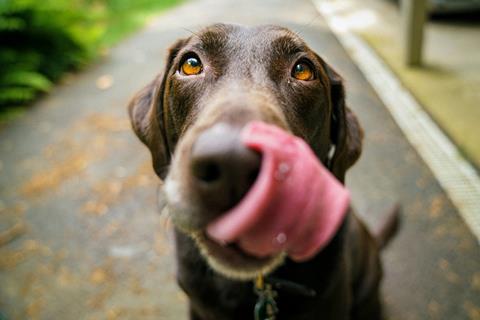Raw meat-based diets for pets can serve as a vehicle for multi-drug resistant pathogens, posing significant risks to their owners, a new study has found.

Scientists in Portugal found that raw meat-based diets could pose a neglected source of human exposure to Salmonella and pathogenic E coli, including those carrying the mcr gene, which confers resistance to colistin, an important antibiotic of last resort. The study was published in Eurosurveillance.
Raw meat diet
Corresponding author Patricia Antunes of the University of Porto said: “In our recent study, we discovered that raw meat-based diets (RMBDs) from European brands commercially available in Portugal can serve as a vehicle for multidrug-resistant (MDR) clinically-relevant Salmonella and E. coli strains carrying genes encoding resistance to the last-resort antibiotic colistin. This finding was published to raise awareness about the significant health risks to people living with pets fed on these diets.”
The team were addressing the increasing popularity of raw meat-based diets for dogs among pet owners. The aim was to investigate whether these foods could be a source of Salmonella or other Enterobacteriaceae resistant to colistin, a crucial antibiotic in human medicine.
Between September 2019 and January 2020, they screened 55 samples from 25 different dog food brands, sourced from 12 suppliers, using standard cultural methods. The analysis included whole genome sequencing and comparative genomics to characterise the isolates.
Resistant bacteria
“We found that only RMDB batches were contaminated. 10 out of 14 samples contained polyclonal multidrug-resistant (MDR) E. coli, and one batch contained MDR Salmonella,” Dr Antunes said.“Notably, one turkey-based sample harboured MDR Salmonella serotype 1,4,[5],12:i:- ST34/cgST142761, similar to human clinical isolates worldwide.
“Additionally, two RMDB samples contained globally dispersed MDR E. coli strains with colistin resistance. In contrast, conventionally processed pet foods were found to be a safer option.”
The team were surprised to find that almost all batches of raw meat-based diets for dogs carried multidrug-resistant bacteria, including pathogenic strains. The discovery of globally significant clones of MDR Salmonella and E. coli, including strains with colistin resistance genes on plasmids identical to those circulating worldwide, underscored a more substantial risk than initially anticipated.
Owners exposed
“Our findings are concerning because they indicate that handling and consumption of RMBDs can expose humans to antibiotic-resistant and pathogenic bacteria, either directly through contact with contaminated food or indirectly through environmental release by pets. This poses a significant public health issue that demands immediate attention and proactive measures,” Dr Antunes said.
“To build on our findings, further research is needed to assess the extent of this problem in other regions and brands. Stricter guidelines and regulations for the production and sale of RMBDs are essential. Additionally, raising awareness among pet owners about the risks and safe handling practices of RMBDs is crucial to mitigate public health risks.”
Colistin withdrawal
The study was conducted by researchers with over 20 years of experience in the molecular epidemiology of foodborne bacteria and antimicrobial resistance (including antibiotics, metals, and biocides/disinfectants), within one of the research lines focusing on One Health, food safety, and the impact of the voluntary withdrawal of colistin in food-animal production in Portugal.
This research was part of a broader effort to identify proactive farm-to-fork measures to mitigate microbiological risks to public health, providing valuable insights for stakeholders in the food industry and policymakers involved in food safety regulation at the One-Health interface.
Patrícia Antunes is Assistant Professor at Faculty of Nutrition and Food Sciences, University of Porto, Porto, Portugal, and Researcher at UCIBIO - Applied Molecular Biosciences Unit and Associate Laboratory i4HB - Institute for Health and Bioeconomy, Laboratory of Microbiology, Department of Biological Sciences, Faculty of Pharmacy, University of Porto, Porto, Portugal.







No comments yet